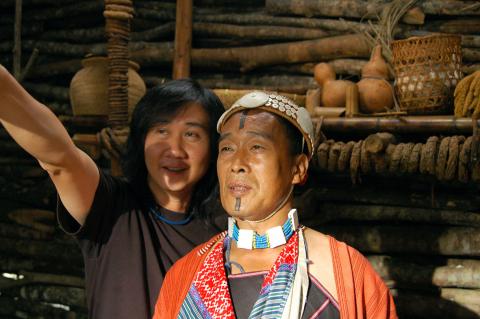Chen Wen-pin (陳文彬) weaves together ancient Atayal (泰雅族) tradition and modern-day social issues in his feature debut Everlasting Moments (靈魂的旅程). Shot mostly in Atayal and Pangcah (Amis) villages and casting locals who speak tribal languages, the film places present-day indigenous life in the context of the ancient migration of the Atayal community. The result is an eloquent reflection on the relationship between Aborigines and nature, and how that harmony can be destroyed by the state apparatus.
Documentary footage of Sanying Aboriginal Community (三鶯部落) and the now demolished Sa’owac Aboriginal Community (撒瓦知部落) on the banks of the Dahan River (大漢溪) shows real-life struggles that Aborigines face in a society dominated by Han Chinese.
Having worked as a social activist and a journalist, the 42-year-old Chen is no stranger to the social injustice and discrimination shown in Everlasting Moments. The idea for the film came about when he was asked to make Msgamil: Once Upon a Time (泰雅千年), a short film commissioned by the Shei-pa National Park Headquarters (雪霸國家公園管理處).

Photo Courtesy of Chen Wen-pin
Initially, the project focused on gaga, the set of ancient teachings and beliefs that the Atayal pass from one generation to the next. A deeper understanding of Aboriginal life and the relocation issues faced by Sanying, Sijhou (溪洲) and other urban Pangcah (the name the Amis use to refer to themselves) communities, however, prompted the director to expand the short work into a feature-length project in order to “rethink the relationship between humanity and nature.”
Chen spent more than a year traveling through most of the country’s Atayal communities before deciding to shoot the film in the villages of Singuang (新光) and Cinsbu (鎮西堡) in Hsinchu County, where he says the loss of the Atayal language and culture are less severe than in other places.
For the set, traditional Atayal structures were built by local residents after discussions with the Han Chinese film crew, and prior to shooting theater veteran Chung Chiao (鍾喬) led workshops to assist villagers — who became actors in the film — in discussing their personal histories and recalling memories “buried inside their bodies.” Several tribal elders worked on the set as language consultants. Chen said that even when the production crew thought that everything was ready, people might not show up because someone had a dream that was interpreted as a bad omen.

Photo courtesy of Chen Wen-pin
“To work with the tribespeople, we had to give up our own ideas and learn to see the world from their perspective,” said Chen, best known for his award-winning performance in No Puedo Vivir Sin Ti (aka Cannot Live Without You, 不能沒有你, 2009).
Chen also drew inspiration for Everlasting Moments from Atayal brothers and musicians Bulang Yukan (不浪尤幹) and Yuraw Yukan (尤勞尤幹), also an actor, whose works include Cheng Wen-tang’s (鄭文堂) Somewhere Over the Dreamland (夢幻部落) and Singing Chen’s (陳芯宜) God Man Dog (流浪神狗人).
Intrigued by the pair’s life stories, the director told his Atayal friends that he would one day write a story about them.

Photo Courtesy of Chen Wen-pin
One year later, Bulang Yukan passed away after falling from the stage while performing a concert in China. The Atayal I Don’t Remember (我所遺忘的泰雅), the last work the musician created, can be heard at the end of Chen’s film.
In Everlasting Moments, Yuraw Yukan plays both an ancient chief and a modern Aboriginal official.
The actor said that while he is usually cast as a drunk or vagabond in movies and television dramas, he feels he plays a real Atayal in Chen’s work.
“Garbed in traditional clothes and painted with facial tattoos, I walked through the mountains, breathed the air and actually felt that the ancestral spirits were around me,” Yuraw Yukan told the Taipei Times.
The film is not without controversy.
Questions are raised in Atayal director Pilin Yabu’s (比令亞布) The Moment Run Through (走過千年), which documents the making of Chen’s Msgamil, the forerunner of Everlasting Moments. According to Yabu’s film, the Han Chinese film crew entered the Atayal communities with the aim of collaborating with the inhabitants, but failed to earn the trust of all the tribespeople, leaving some feeling they had been lied to and used.
The Moment Run Through DVD can be purchased online at www.govbooks.com.tw or www.books.com.tw.

April 14 to April 20 In March 1947, Sising Katadrepan urged the government to drop the “high mountain people” (高山族) designation for Indigenous Taiwanese and refer to them as “Taiwan people” (台灣族). He considered the term derogatory, arguing that it made them sound like animals. The Taiwan Provincial Government agreed to stop using the term, stating that Indigenous Taiwanese suffered all sorts of discrimination and oppression under the Japanese and were forced to live in the mountains as outsiders to society. Now, under the new regime, they would be seen as equals, thus they should be henceforth

With over 100 works on display, this is Louise Bourgeois’ first solo show in Taiwan. Visitors are invited to traverse her world of love and hate, vengeance and acceptance, trauma and reconciliation. Dominating the entrance, the nine-foot-tall Crouching Spider (2003) greets visitors. The creature looms behind the glass facade, symbolic protector and gatekeeper to the intimate journey ahead. Bourgeois, best known for her giant spider sculptures, is one of the most influential artist of the twentieth century. Blending vulnerability and defiance through themes of sexuality, trauma and identity, her work reshaped the landscape of contemporary art with fearless honesty. “People are influenced by

Last week, the the National Immigration Agency (NIA) told the legislature that more than 10,000 naturalized Taiwanese citizens from the People’s Republic of China (PRC) risked having their citizenship revoked if they failed to provide proof that they had renounced their Chinese household registration within the next three months. Renunciation is required under the Act Governing Relations Between the People of the Taiwan Area and the Mainland Area (臺灣地區與大陸地區人民關係條例), as amended in 2004, though it was only a legal requirement after 2000. Prior to that, it had been only an administrative requirement since the Nationality Act (國籍法) was established in

The remains of this Japanese-era trail designed to protect the camphor industry make for a scenic day-hike, a fascinating overnight hike or a challenging multi-day adventure Maolin District (茂林) in Kaohsiung is well known for beautiful roadside scenery, waterfalls, the annual butterfly migration and indigenous culture. A lesser known but worthwhile destination here lies along the very top of the valley: the Liugui Security Path (六龜警備道). This relic of the Japanese era once isolated the Maolin valley from the outside world but now serves to draw tourists in. The path originally ran for about 50km, but not all of this trail is still easily walkable. The nicest section for a simple day hike is the heavily trafficked southern section above Maolin and Wanshan (萬山) villages. Remains of